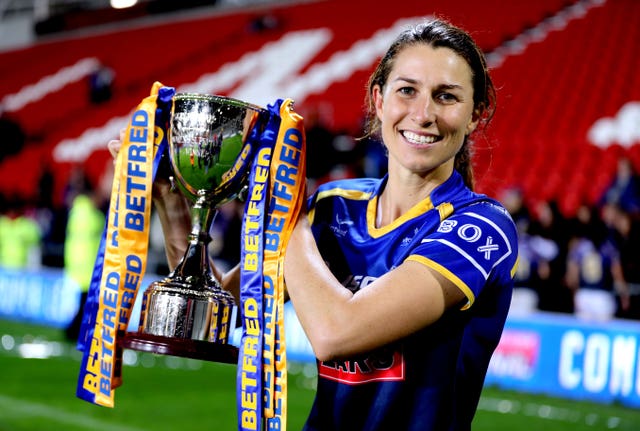
From hordes of screaming fans to seemingly endless requests for autographs and photos, England women’s rugby league captain Emily Rudge has had first-hand experience of the adulation her sport can offer.
Unfortunately for Rudge, her brief taste of rock-star treatment occurred almost 10,000 miles away in Papua New Guinea, during her team’s three-match Test tour to the rugby league-mad nation at the end of 2019.
“I guess that’s what it’s like to be a major celebrity,” Rudge told the PA news agency as she recalled the unprecedented trip to face the home nation’s Orchids.

“We’d go out on the bus and there would be people running alongside shouting things, everybody wanting to get pictures and autographs.
“It was incredible and it really put us on a pedestal when we were out there. They made us feel like incredible athletes and it would be really nice to bring some of that back over here.”
Similar levels of fame are still some years away back home, with players squeezing training sessions between full-time jobs as they prepare for the return of the Women’s Super League season next month.
But Rudge and her wife Gemma Walsh, both of whom now play or St Helens, hope the unprecedented build-up to this year’s World Cup will accelerate the encouraging changes they have already seen take hold the domestic sport.
“The World Cup is a great opportunity to show the women’s game on TV and raise its profile, and hopefully it will inspire more girls to want to be a part of the sport,” added Rudge.
“A couple of years ago I remember getting some negativity because people would say, ‘you play for England but only about 300 women play rugby league so you’re not that good.’
https://twitter.com/RLWC2021/status/1366025369497653248
“Times have changed massively. There’s a lot more girls playing now and I think that has had a great impact on the elite level. It is a lot more professional and there is a higher standard of support.”
Both Rudge and Walsh believe International Women’s Day plays a valuable role in focusing girls’ minds on the possibilities that sport can offer, and shattering some of the misconceptions they had to confront in the early days of their respective careers.
“A few years ago, we would go to World Cups and nobody really knew they were happening,” said Walsh, who represented England in previous World Cups but is now retired from international duty.
“The way it’s being marketed this time can only be a positive thing. I’m jealous that I’m not 10 years younger. I see what Emily experienced in Papua New Guinea, and how the game is growing now, and we didn’t get any of that recognition that we deserved.”
For Rudge, a successful World Cup campaign will go hand-in-hand with the opportunity to further establish the sport, and potentially produce a generation of stars who will tempt young British girls to emulate their star-struck Papuan counterparts.
“I think it’s really important that young girls in the game have female role models to look up to,” said Rudge.
“We didn’t really have that. Even though there were some women playing when I was a young girl, I wasn’t aware of it. When Gemma was at Wigan last year, some girls were getting her name on their backs of their shirts, and that was an amazing thing.”


Comments: Our rules
We want our comments to be a lively and valuable part of our community - a place where readers can debate and engage with the most important local issues. The ability to comment on our stories is a privilege, not a right, however, and that privilege may be withdrawn if it is abused or misused.
Please report any comments that break our rules.
Read the rules here